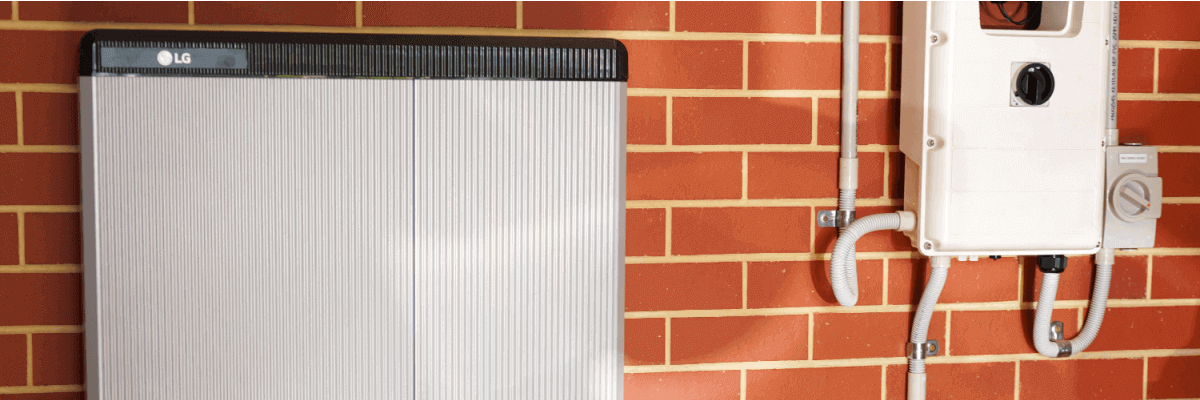KEY POINTS
- Solar batteries work as a storage unit for excess solar power that’s been generated by PV solar panels.
- Prices in Australia typically cost between $870 – $2,060 per kilowatt hours (kWh) of storage capacity.
- A solar battery and installation can cost up to $12,000 or more in some cases.
Solar battery storage technology has generated a lot of discussion within the energy industry in recent years, and for good reason.
Australia has one of the highest penetrations of rooftop solar panels worldwide, and householders are now looking for ways to further optimise their solar systems and reduce their reliance on grid electricity. But are solar batteries really worth it?
In this article, Canstar Blue examines what to consider before installing a solar battery, from the expected costs to whether the investment is worth it in the long term.
On this page:
Advertisement
How do solar batteries work?
Solar batteries store excess solar power generated by solar photovoltaic (PV) panels. Instead of sending any unused solar energy back to the grid in exchange for a solar feed-in tariff (FiT), additional energy is saved for later, when your solar panels are no longer generating energy.
How much does a solar battery cost?
According to the experts at Solar Quotes, installed solar battery prices in Australia typically cost between $870 – $2,060 per kilowatt hours (kWh) of storage capacity. Using this formula, a 4kWh battery would cost $3,480 – $8,240.
However, the final cost of installing a solar battery will depend on the brand of battery, installation fees, whether or not you need a solar inverter and any safety features, such as fire-resistant backing and shading for the battery.
Many states and territories now offer solar rebates and discounts to eligible homes and small businesses looking to install batteries or solar storage units. These incentives can help to lower the initial installation and purchase costs of the battery system.
To see if your state or territory is offering any interest-free loans or rebates for solar storage, it is best to visit your relevant government website.
You might also be interested in:
Is solar battery storage worth it?
Whether it is worth getting a solar battery installed will come down to your personal energy usage habits.
Installing a solar battery without accommodating your energy usage habits could leave you disappointed with the return on your investment.
A solar battery works best when it’s combating the typical constraints of the grid, such as higher demand in the evenings or more expensive power prices during peak times.
Your reliance on grid energy may also play a part in deciding whether solar storage is worth the cost. If you are looking to take as much of your energy usage off-grid as possible, then solar storage is something to seriously consider.
If the area you live in is prone to frequent power outages, installing a solar battery with backup capabilities may be worth the upfront cost of having undisturbed access to energy.
Whether to save money on your bills or reduce your carbon emissions, a solar battery will be able to help you build a foundation for independent energy usage – granted you can afford the upfront cost of solar batteries.
Before making a decision, it’s a good idea to get the opinion of a solar installer first. A solar installer or solar storage specialist can help you look at options based on your household size, energy usage data and geographical location to see which product or system may be the right fit for you.
Solar battery payback periods
Payback calculations will vary depending on your energy usage, solar system, electricity plan and solar FiT. The following estimation is based on Solar Choice’s calculations using a 6.6kWh solar system and a 10kWh solar battery.
← Mobile/tablet users, scroll sideways to view full table →
| System | Cost | Annual savings | Payback period |
|---|---|---|---|
| 6.6kW solar and 10kWh battery | $12,680 – total | $2,197 – total | 6.2 years – total |
| $5,080 – solar | $1,093 – solar | 4.6 years – solar | |
| $7,600 – battery | $908 – battery | 8.4 years – battery | |
| $196 – FiT |
Source: Solar Choice
This estimation is assuming the electricity rate of the household is 35c/kWh with a solar FiT of 5c/kWh. When comparing your energy usage and potential solar system payback period, consider the life of your solar package and whether the payback estimate is going to be longer than the life of your system.
The previous assumption shows an average payback period of 4.6 – 8.4 years, which is longer than the life of some solar packages. This is something you can discuss with your solar installer.
How long do solar batteries last?
Typically, a solar battery can last between five to 15 years before it needs replacing. One of the ways a battery’s lifespan is measured is in cycles, which is how many times the battery can be charged and drained. Most batteries assume one cycle per day. The more cycles a battery has, the longer its lifespan.
Solar plans and prices
Here are some of the cheapest solar-specific deals from the retailers on our database. These costs are based on the Ausgrid network in Sydney but prices will vary depending on your circumstances. We show one product per retailer, listed in order of lowest price first. Annual price estimates assume general energy usage of 3900kWh/year for a residential customer on a single rate tariff. Price estimates exclude solar feed-in tariff credits. These are products from referral partners†. Our database may not cover all deals in your area, and please check retailer websites for up to date information.
Here are some of the cheapest solar-specific deals from the retailers on our database. These costs are based on the Citipower network in Melbourne but prices will vary depending on your circumstances. We show one product per retailer, listed in order of lowest price first. Annual price estimates assume general energy usage of 4000kWh/year for a residential customer on a single rate tariff. Price estimates exclude solar feed-in tariff credits. These are products from referral partners†. Our database may not cover all deals in your area, and please check retailer websites for up to date information.
Here are some of the cheapest solar-specific deals from the retailers on our database. These costs are based on the Energex network in Brisbane but prices will vary depending on your circumstances. We show one product per retailer, listed in order of lowest price first. Annual price estimates assume general energy usage of 4600kWh/year for a residential customer on a single rate tariff. Price estimates exclude solar feed-in tariff credits. These are products from referral partners†. Our database may not cover all deals in your area, and please check retailer websites for up to date information.
Here are some of the cheapest solar-specific deals from the retailers on our database. These costs are based on SA Power network in Adelaide but prices will vary depending on your circumstances. We show one product per retailer, listed in order of lowest price first. Annual price estimates assume general energy usage of 4000kWh/year for a residential customer on a single rate tariff. Price estimates exclude solar feed-in tariff credits. These are products from referral partners†. Our database may not cover all deals in your area, and please check retailer websites for up to date information.
Will I save money with a solar battery?
While solar batteries will help you cut costs on your electricity bill by reducing your reliance on the grid, they are still a significant financial investment.
A solar battery and installation can cost up to $12,000 depending on location and type of solar battery package, so it’s important to calculate your cost savings and energy usage over time and understand how long it will take you to pay off your investment.
How to get the most out of a solar battery
To maximise the potential savings of a solar battery, it’s important to ensure you have adjusted your energy usage habits to best suit the requirements of your solar battery and panel system. This might mean looking into a variable electricity tariff, such as a controlled load or time of use tariff.
Time of use and other variable rate tariffs charge different rates at certain times, meaning electricity is usually the cheapest during normal working hours and very late at night. Electricity is more expensive during peak demand times – generally between 4pm and 8pm.
Households and businesses on this type of tariff could use stored solar power generated from off-peak periods to cover peak-period energy usage instead of relying on the electricity grid and paying higher peak rates. Most solar batteries can be set to automatically work between these hours, while some systems are compatible with energy apps that let you monitor and control when or how your stored solar power is used.
As for a controlled load tariff, this can also speed-up your solar battery savings as energy-intensive appliances (e.g. pool pump) connected to this tariff only require electricity for a few hours a day. Customers can even connect their solar battery to a controlled load and charge their battery overnight with grid electricity at a cheaper rate. By morning, they can use their charged battery, rather than pay the full price for electricity.
While single rate tariff consumers can’t tap into varying electricity rates, they may choose instead to significantly minimise their reliance on the grid – forgoing the need for cheaper grid electricity prices entirely. Do take note that you’ll need to install a solar inverter or net meter to consume your solar-generated energy.
Another way could be joining a Virtual Power Plant (VPP) network and earning credits for sharing their solar energy during peak demand times.
At the end of the day, making the most out of your solar battery will come down to taking advantage of the options available to your household or business.
If you’re looking for a solar installer, check out our annual Solar Energy Installer customer satisfaction ratings below. There you’ll find the installers that Australian solar consumers have rated top notch for service, price, products and more.
Compare Solar Panel Installers
Original reporting by Jared Mullane
Image Source: Milleflore Images/Shutterstock.com




Share this article